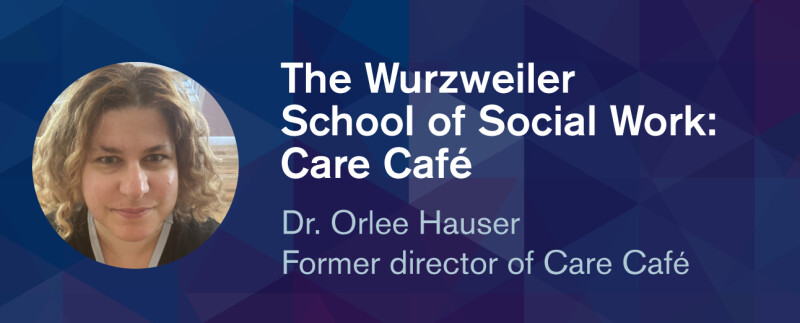The Wurzweiler School of Social Work’s Care Café is a community-based program providing psychoeducational support ‘cafés’ throughout the New York City metro area, and most recently, on Zoom, as adaptations were made in the face of the COVID-19 pandemic. The Care Café was the brainchild of Dr. Danielle Wozniak, MSW and dean of the school, and was born from a mission to provide outreach and involvement in the health of communities in and around Yeshiva University.
Dr. Orlee Hauser, who served as the director of the Care Café until June of this year, shared more on the mission of the program and how Yeshiva University students are making a difference in the community.
Supporting Vulnerable Populations
The idea for the Care Café came to Wozniak after she read about maintenance cafés held in Europe, where people would come and have a cup of coffee and then learn something useful, like how to repair their bike or a microwave, for example. Wozniak thought of the Care Café as “auto repair for our soul.” It began as pop-up workshops and events around New York City with a café atmosphere. Due to the pandemic, events moved to take place online, but the idea to bring people together to learn has endured. The café reaches people from different vulnerable populations to learn and acquire new skills around mental health.
The Care Café has run on four different grants from the city, one of which is specifically for veterans. Initiatives include mental health services for veterans, supporting those who struggle with signature injuries of war including PTSD, trauma and substance abuse. The program also helps veterans through conflicts, both combat and non-combat, and military families.
Among the vulneranle populations served by the café, Holocaust survivors are a focus. The Care Café focuses on major celebrations for Holocaust survivors, but Hauser noted that the program works with this population every week to help them through the social isolation that has been rampant with the pandemic. “We have someone come in and facilitate singing and storytelling and conversation with them every single week online. It's often the same women who come, but then there'’ some people who pop in and out,” she said.
MSW Student Involvement in the Care Café
Master of Social Work (MSW) students can take the opportunity to get involved with the Care Café and its various events. Before the pandemic, students attended the events and were there to help with resources afterward, assisting attendees in getting more information or helping set them up with certain services. Now, they have been involved online as presenters and liaisons, handling administrative tasks. Hauser highlighted an event that was solely run by MSW students on reproductive health in the Orthodox community.
For the veteran population, various talks are held during the year. One such event honored indigenous veterans, helping them to combat stress. An MSW student, who also is a veteran, facilitated the talk. A number of students also assisted with a large resource fair for the veterans, getting together to run presentations and to create a resource guide for attendees.
“This event was a benefit to the students and veterans alike,” Hauser said. “When students go into the field, they are likely going to end up working with veterans in one way or another, even if they don't specifically focus on that population.”
One benefit of the Care Café being held online is that students and other people outside of New York are able to participate, although Hauser noted that it is meant to function within the boundaries of New York City because of the grants. “I think that, until funding changes, if it ever does, the Care Café will probably remain New York-centric, but only as far as the clients,” said Hauser. “For the students, because we do so much online today and will probably continue to do that even when the pandemic is over, I can see many opportunities for students who live elsewhere to take part.”
The online portion of the program is especially beneficial to students enrolled in the online MSW program, as it can allow them to gain valuable experience and insights into the people and populations served by the café.
Benefits to Social Worker Students
For Hauser, who is a sociologist, stepping up as director of the Care Café was her first time doing social work. “What I noticed is that if you want to get something done in social work, you have to go in and do it,” she said. “And it seems like such a big step for students to start being involved in these populations, because to me, social work is like doing field work in sociology. You can talk about or read about or interview people, but until you’ve gotten in there and lived with people, that’s the only way you can really understand.”
Through Care Café, social work students have the opportunity to test the waters and get a feel for the work. “I think the biggest impact the café can have on students is that they really learn about the different populations that they’re going to be helping in the future. They learn to respect the different cultures and feel more comfortable,” Hauser said. “For instance, veterans have a culture that is different from non-veteran culture, and they have a very strong feeling that no one can understand them if that person is not a veterans. But through the café, students can learn.”
Hauser notes that she has learned so much about veterans that she has taken into her everyday life, and she’s certain that social work students who have been involved feel the same way. “It just makes you a better social worker when you know the environment. It may not be easy to quantify the experience on a resume, but it certainly comes across in practice.”
Learn more about the Care Café and explore opportunities to make a difference to vulnerable populations and grow your career through the online MSW program.

